Module 11 Way of life Unit 1 In China ,we open a gift later.教学课件
文档属性
| 名称 | Module 11 Way of life Unit 1 In China ,we open a gift later.教学课件 | 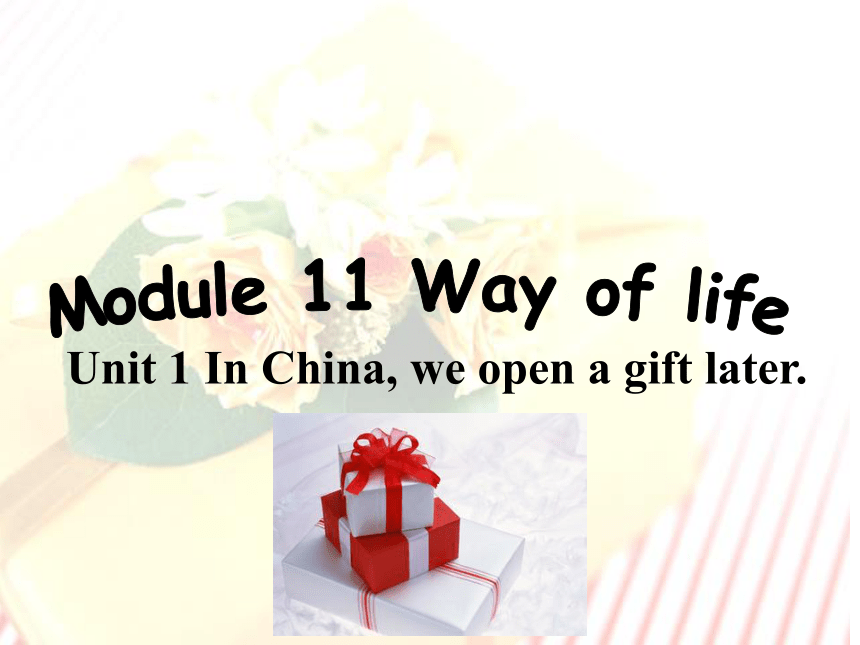 | |
| 格式 | zip | ||
| 文件大小 | 1.7MB | ||
| 资源类型 | 教案 | ||
| 版本资源 | 外研版 | ||
| 科目 | 英语 | ||
| 更新时间 | 2014-12-26 08:19:35 | ||
图片预览


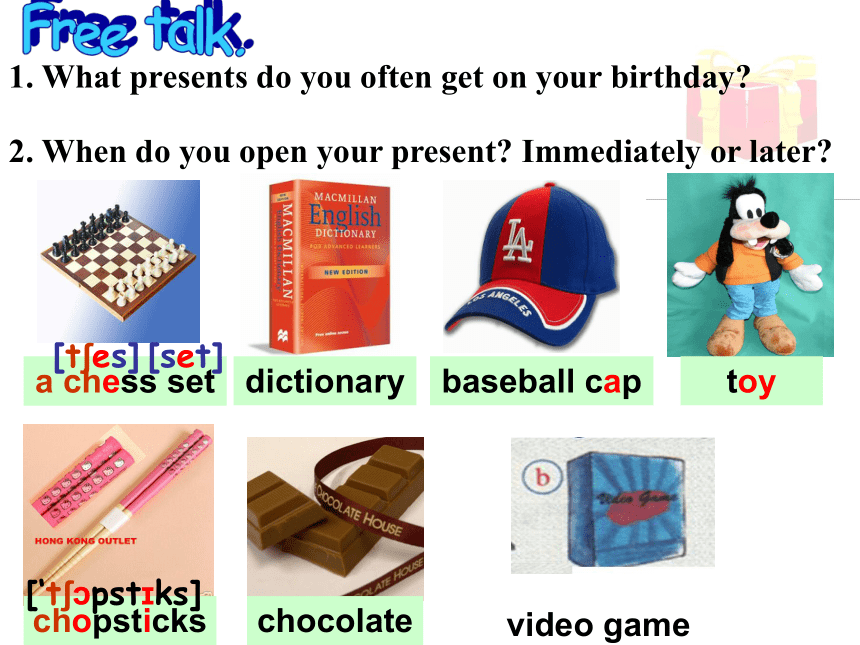
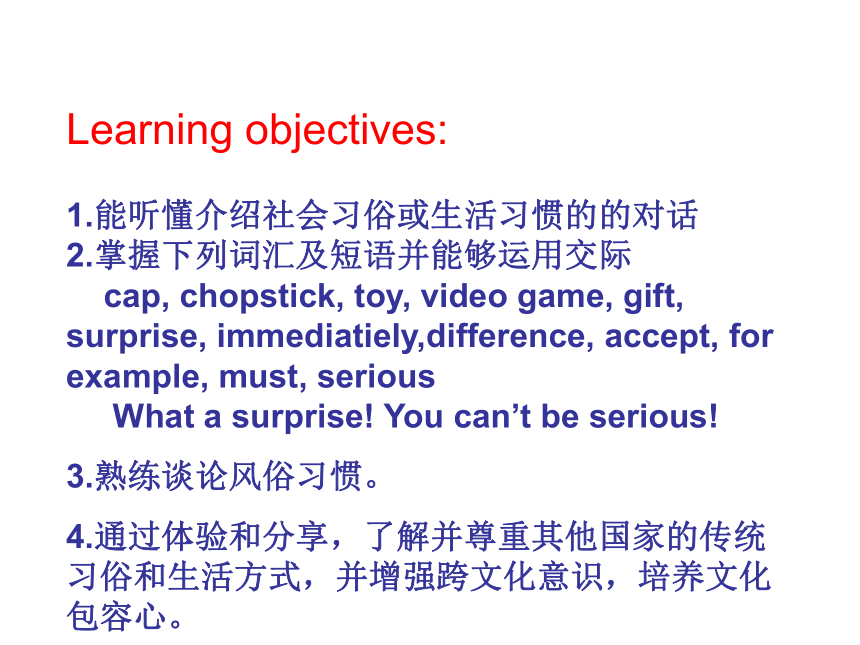
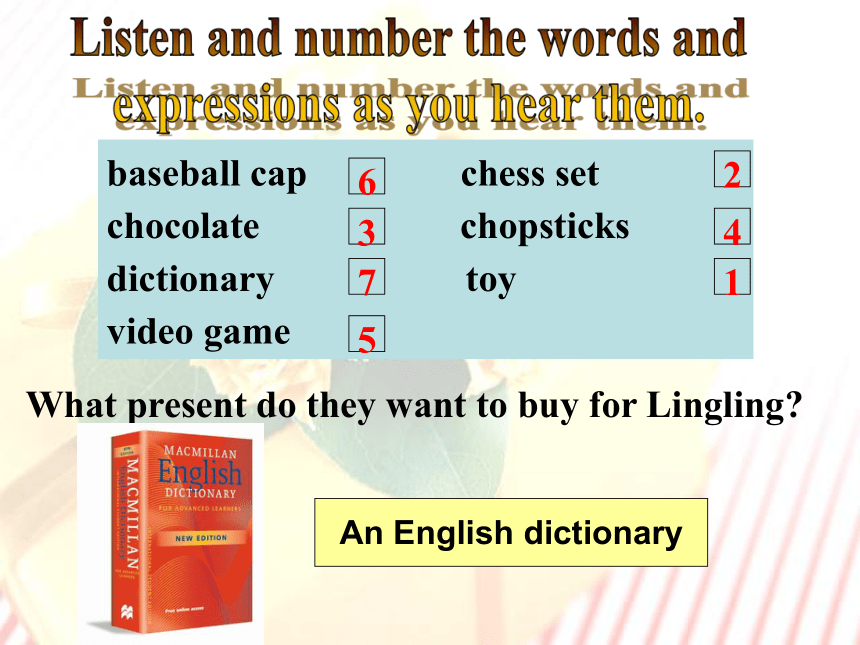
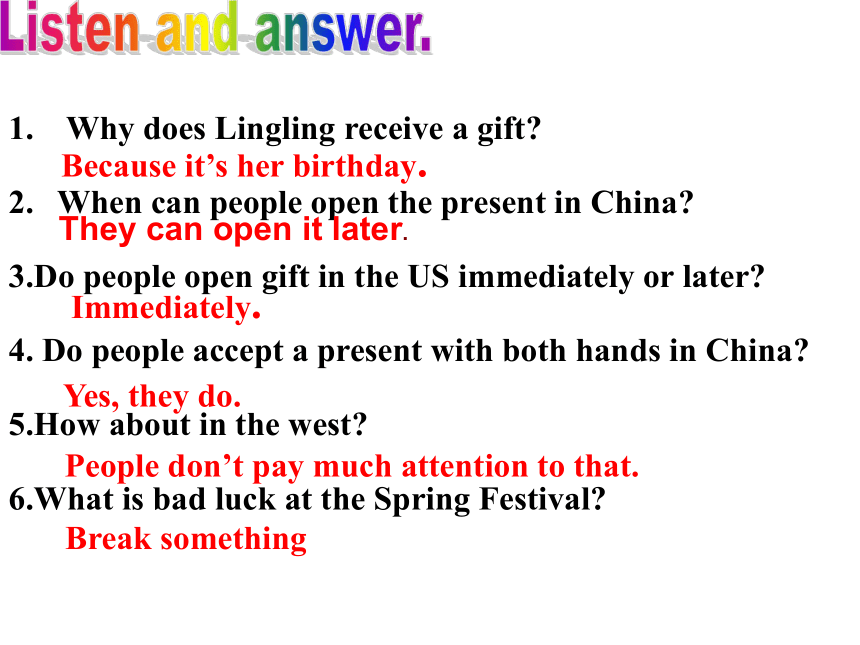

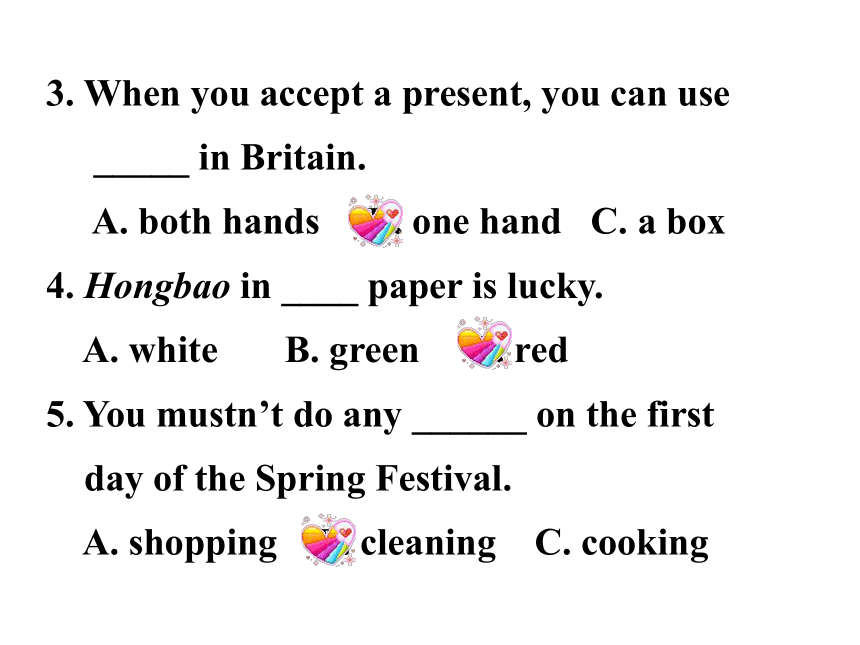

文档简介
课件24张PPT。Module 11 Way of lifeUnit 1 In China, we open a gift later. Module 11 Way of lifeUnit 1 In China, we open a gift later.Free talk.1. What presents do you often get on your birthday?a chess set[t?es][set]chocolatechopsticks[‘t??pst?ks] dictionarybaseball captoy2. When do you open your present? Immediately or later?video gameLearning objectives:
能听懂介绍社会习俗或生活习惯的的对话
掌握下列词汇及短语并能够运用交际
cap, chopstick, toy, video game, gift, surprise, immediatiely,difference, accept, for example, must, serious
What a surprise! You can’t be serious!
3.熟练谈论风俗习惯。
4.通过体验和分享,了解并尊重其他国家的传统习俗和生活方式,并增强跨文化意识,培养文化包容心。Listen and number the words and
expressions as you hear them.1234567What present do they want to buy for Lingling?An English dictionaryListen and answer.Why does Lingling receive a gift?
When can people open the present in China?
3.Do people open gift in the US immediately or later?
4. Do people accept a present with both hands in China?
5.How about in the west?
6.What is bad luck at the Spring Festival?
Because it’s her birthday. Immediately.They can open it later.Yes, they do. People don’t pay much attention to that.Break somethingChoose the best answer for each sentence. In the USA, when someone gives you
a present, you must open it _______.
A. later B. immediately
C. five minutes
2. When you accept a present, you must use _____ in China.
A. left hand B. both hands
C. right hand3. When you accept a present, you can use
_____ in Britain.
A. both hands B. one hand C. a box
4. Hongbao in ____ paper is lucky.
A. white B. green C. red
5. You mustn’t do any ______ on the first
day of the Spring Festival.
A. shopping B. cleaning C. cooking1. Open a present immediately when you receive it.
2. Accept a present with both hands.
3. Use red paper for hongbao.
4. Do cleaning on the first day of the Spring Festival.
5. Break something during the Spring Festival.
6. Have your hair cut during the Spring Festival month.√√Listen and fill in the blanks.In China, what traditions do you know?1. We open a gift _______.2. You accept a gift with ___________. 3. People say you mustn’t _____________on the first day of the Spring Festival.4. You mustn't _____________.5. You must only use red paper for hongbao because red __________.6. You’d better not _______________ during the Spring Festival month.7. In the north of China, people eat __________ !laterboth handsdo any cleaningbreak anythingmeans luckhave your haircutlots of jiaoziIn the US, we open a gift ____________.
In the West, we usually _________ pay much attention to that.What’s the tradition in the West?immediatelydon’t1.Listen and repeat.
2.Read in groups.Read and find out the phrases.
1.你们记着呢。
2.真是个惊喜。
3.待会儿打开礼物
4.立即打开礼物
5.注意到另一个不同
6.用双手接过礼物
7.过多的注意
8.对做某事感兴趣
9.例如
10.坏运气
11.最好做某事
12.不会吧You rememberd.
What a surprise.
open a gift later
open a gift immediately
notice another difference
accept a gift with both hands
pay much attention to
be interested to do
for example
bad luck
had better do
you can’t be serious.
Fill in the blanks.
1.在中国,我们稍候打开礼物。
In China, we ________ _____ _________ ___________.
2.但是在美国,我们立即打开礼物。
But back in the US, we _____ ___ ________ ___________.
3.你不必等。You __________ ____________.
4.在中国,你用双手接受礼物。
In China, you _________ ____ ______ ______ ________ __________.
5.但是在西方,我们通常不太注重那个。
But in the west, we usually don’t ______ ________ ____________ ____that.
6.大年初一你 不许打扫卫生。
You _________do any cleaning on the first day of the Spring Festival.
7.正月你最好不要理发。
You ________ ________ _____ __________your hair cut during the Spring Festival.
8.你不是认真的吧。 You __________ ________ ____________.
must 的用法
1) 表示主观的义务和必要,主要用于肯定句和疑问句,意思为 “必须……,得……,要……”;由must引起的疑问句,肯定回答要用must,否定回答要用needn’t,意思是“不必”;must的否定形式mustn’t表示禁止,意思是“不能,不许”。Grammare.g.
—Must I finish the task right now?
—No, you needn’t.
我必须现在就完成任务吗?
不,你不需要。
You mustn’t come here without permission.
没有允许你不准来这。2) 表示肯定的猜测,常用于肯定句中,
意为 “一定是,必然……”。
e.g. Your sister must be a doctor in this hospital. ( 现在的猜测 ) 你的妹妹现在一定在这家医院当医生。
He must be reading newspapers in the reading room now.(正在进行的猜测)他现在肯定正在阅读室看报纸。have to 与must的区别
两都都表示“必须”,但must侧重于说话者的主观看法,认为有必要或有义务去做某事;have to侧重于客观需要,含有“不得不,被迫”之意。
e.g. All passengers must wear seat belts.
所有乘客都要系安全带。
My bike was broken yesterday, so I
had to walk to school. 昨天我的自行
车坏了,所以我只能走路去学校。can 的用法
can的否定形式为cannot,缩写为can't。
1) 表示能力
e.g. I can’t swim. 我不会游泳。
Can you drive? 你会开车吗?注意:
can表示能力可与be able to互换使用,且后者有更多的时态,be able to常被用来表示can所不能表示的将来或完成的概念。
e.g. They will be able to run this machine
on their own in three months.
他们将在未来的三个月自己操作这
个机器。2) 表示可能性,意思是:可以,可能。
e.g. That big cinema can seat 2,000 people.
那个大影院可以坐2000人。
He can be very friendly at times.
他有时可能非常友善。3) 表示允诺,意思是:可以,能够。
e.g. You can have the book when I have finished it.
在我读完这本书后,你可以看。
Can I use your pen?
我能用下你的笔吗?4) 表示惊异、不相信、猜测等(用于疑问句、否定句或感叹句中),意思是:会,可能。
e.g. This can’t be true.
这不可能是真的。
Can it be true?
这能成真吗?Homework:
能听懂介绍社会习俗或生活习惯的的对话
掌握下列词汇及短语并能够运用交际
cap, chopstick, toy, video game, gift, surprise, immediatiely,difference, accept, for example, must, serious
What a surprise! You can’t be serious!
3.熟练谈论风俗习惯。
4.通过体验和分享,了解并尊重其他国家的传统习俗和生活方式,并增强跨文化意识,培养文化包容心。Listen and number the words and
expressions as you hear them.1234567What present do they want to buy for Lingling?An English dictionaryListen and answer.Why does Lingling receive a gift?
When can people open the present in China?
3.Do people open gift in the US immediately or later?
4. Do people accept a present with both hands in China?
5.How about in the west?
6.What is bad luck at the Spring Festival?
Because it’s her birthday. Immediately.They can open it later.Yes, they do. People don’t pay much attention to that.Break somethingChoose the best answer for each sentence. In the USA, when someone gives you
a present, you must open it _______.
A. later B. immediately
C. five minutes
2. When you accept a present, you must use _____ in China.
A. left hand B. both hands
C. right hand3. When you accept a present, you can use
_____ in Britain.
A. both hands B. one hand C. a box
4. Hongbao in ____ paper is lucky.
A. white B. green C. red
5. You mustn’t do any ______ on the first
day of the Spring Festival.
A. shopping B. cleaning C. cooking1. Open a present immediately when you receive it.
2. Accept a present with both hands.
3. Use red paper for hongbao.
4. Do cleaning on the first day of the Spring Festival.
5. Break something during the Spring Festival.
6. Have your hair cut during the Spring Festival month.√√Listen and fill in the blanks.In China, what traditions do you know?1. We open a gift _______.2. You accept a gift with ___________. 3. People say you mustn’t _____________on the first day of the Spring Festival.4. You mustn't _____________.5. You must only use red paper for hongbao because red __________.6. You’d better not _______________ during the Spring Festival month.7. In the north of China, people eat __________ !laterboth handsdo any cleaningbreak anythingmeans luckhave your haircutlots of jiaoziIn the US, we open a gift ____________.
In the West, we usually _________ pay much attention to that.What’s the tradition in the West?immediatelydon’t1.Listen and repeat.
2.Read in groups.Read and find out the phrases.
1.你们记着呢。
2.真是个惊喜。
3.待会儿打开礼物
4.立即打开礼物
5.注意到另一个不同
6.用双手接过礼物
7.过多的注意
8.对做某事感兴趣
9.例如
10.坏运气
11.最好做某事
12.不会吧You rememberd.
What a surprise.
open a gift later
open a gift immediately
notice another difference
accept a gift with both hands
pay much attention to
be interested to do
for example
bad luck
had better do
you can’t be serious.
Fill in the blanks.
1.在中国,我们稍候打开礼物。
In China, we ________ _____ _________ ___________.
2.但是在美国,我们立即打开礼物。
But back in the US, we _____ ___ ________ ___________.
3.你不必等。You __________ ____________.
4.在中国,你用双手接受礼物。
In China, you _________ ____ ______ ______ ________ __________.
5.但是在西方,我们通常不太注重那个。
But in the west, we usually don’t ______ ________ ____________ ____that.
6.大年初一你 不许打扫卫生。
You _________do any cleaning on the first day of the Spring Festival.
7.正月你最好不要理发。
You ________ ________ _____ __________your hair cut during the Spring Festival.
8.你不是认真的吧。 You __________ ________ ____________.
must 的用法
1) 表示主观的义务和必要,主要用于肯定句和疑问句,意思为 “必须……,得……,要……”;由must引起的疑问句,肯定回答要用must,否定回答要用needn’t,意思是“不必”;must的否定形式mustn’t表示禁止,意思是“不能,不许”。Grammare.g.
—Must I finish the task right now?
—No, you needn’t.
我必须现在就完成任务吗?
不,你不需要。
You mustn’t come here without permission.
没有允许你不准来这。2) 表示肯定的猜测,常用于肯定句中,
意为 “一定是,必然……”。
e.g. Your sister must be a doctor in this hospital. ( 现在的猜测 ) 你的妹妹现在一定在这家医院当医生。
He must be reading newspapers in the reading room now.(正在进行的猜测)他现在肯定正在阅读室看报纸。have to 与must的区别
两都都表示“必须”,但must侧重于说话者的主观看法,认为有必要或有义务去做某事;have to侧重于客观需要,含有“不得不,被迫”之意。
e.g. All passengers must wear seat belts.
所有乘客都要系安全带。
My bike was broken yesterday, so I
had to walk to school. 昨天我的自行
车坏了,所以我只能走路去学校。can 的用法
can的否定形式为cannot,缩写为can't。
1) 表示能力
e.g. I can’t swim. 我不会游泳。
Can you drive? 你会开车吗?注意:
can表示能力可与be able to互换使用,且后者有更多的时态,be able to常被用来表示can所不能表示的将来或完成的概念。
e.g. They will be able to run this machine
on their own in three months.
他们将在未来的三个月自己操作这
个机器。2) 表示可能性,意思是:可以,可能。
e.g. That big cinema can seat 2,000 people.
那个大影院可以坐2000人。
He can be very friendly at times.
他有时可能非常友善。3) 表示允诺,意思是:可以,能够。
e.g. You can have the book when I have finished it.
在我读完这本书后,你可以看。
Can I use your pen?
我能用下你的笔吗?4) 表示惊异、不相信、猜测等(用于疑问句、否定句或感叹句中),意思是:会,可能。
e.g. This can’t be true.
这不可能是真的。
Can it be true?
这能成真吗?Homework:
同课章节目录
- Module 1 How to learn English
- Unit 1 Let's try to speak English as much as possi
- Unit 2 You should smile at her.
- Unit 3 Language in use .
- Module 2 My home town and my country
- Unit 1 It's taller than many other buildings.
- Unit 2 Cambridge is a beautiful city in the east o
- Unit 3 Language in use .
- Module 3 Sports.
- Unit 1 Nothing is more exciting than playing tenni
- Unit 2 This year we training more carefully.
- Unit 3 Language in use .
- Module 4 Planes, ships and trains .
- Unit 1 He lives the farthest from school.
- Unit 2 What is the best way to travel.
- Unit 3 Language in use .
- Module 5 Lao She Teahouse.
- Unit 1 I wanted to see the Beijing Opera.
- Unit 2 It descibes the changes in Chinese society.
- Unit 3 Language in use .
- Module 6 Animals in danger.
- Unit 1 It allows people to get closer to them .
- Unit 2 The WWF is working hard to save them all.
- Unit 3 Language in use .
- Revision module A
- Module 7 A famous story
- Unit 1 Alice was sitting with her sister by the ri
- Unit 2 She was thinking about her cat.
- Unit 3 Language in use .
- Module 8 Accidents
- Unit 1 While the car were changing to red, a car s
- Unit 2 I was trying to pick it up when it bite me
- Unit 3 Language in use .
- Module 9 Population
- Unit 1 The population of China is about 1.37 billi
- Unit 2 Arnwick was a city with 200,000 people.
- Unit 3 Language in use .
- Module 10 The weathe
- Unit 1 It might snow.
- Unit 2 The weather is fine all year round.
- Unit 3 Language in use .
- Module 11 Way of life
- Unit 1 In China ,we open a gift later.
- Unit 2 In England, you usually drink tea with milk
- Unit 3 Language in use .
- Module 12 Help
- Unit 1 What should we do before help arrives?
- Unit 2 Stay away from windows and heavy furniture.
- Unit 3 Language in use .
- Revision module B
